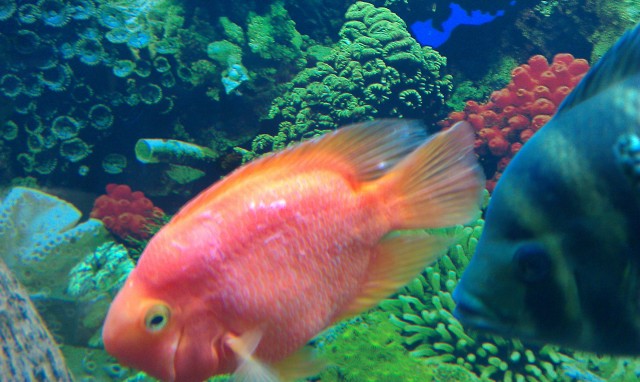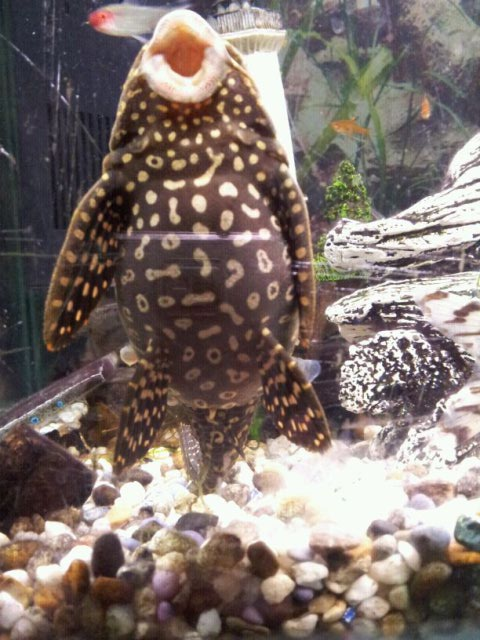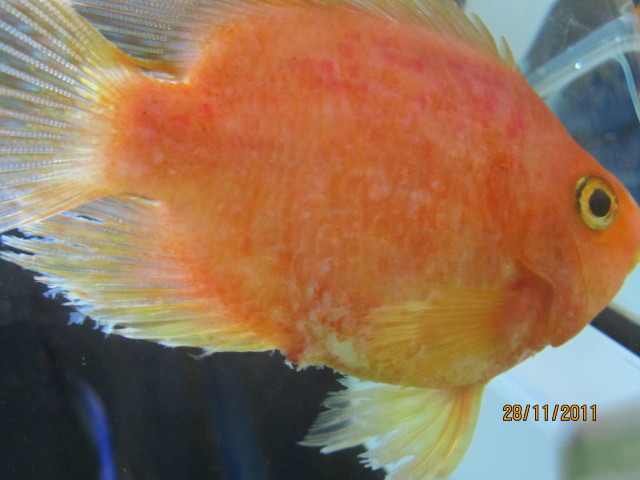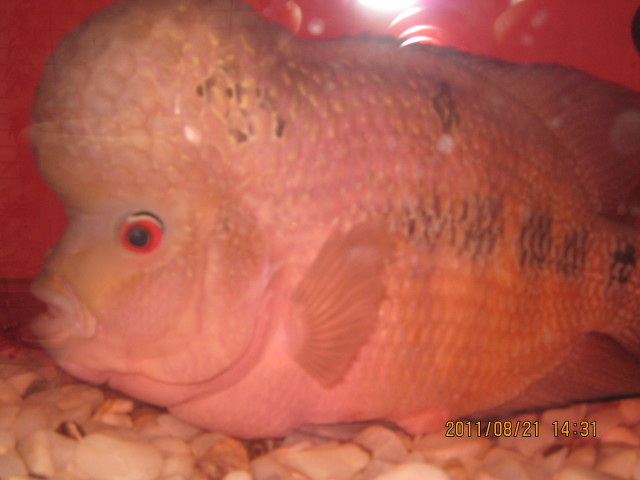QuestionHi agian Karen,
How are you? I have a big job for you, i want all the information about Flower Horn Cichlids. I want tons and tons of info about them. I had already asked you for Scientific names which you promptly provided. Now i also want information about the memory of the foll fish-
1)GOldfish
2)Cichlids(Flower Horn, Convict and such)
3)Catfish(Cories etc)
4)tetras
I hope i am not testing your patience too much...Sorry, but the competion(& project is on Tuesday and i am representing my city, so i am a bit nervous)I am once again sorry.
.....Srinivas
AnswerHi Srinivas! By the way I'm fine, thank you!
Wow, that's a big project for me...Um...I am sure I can pull it off. I am a bit uncertain as to what you mean by the "memory" of the fish you listed, tetras, cichlids ect... By memory do you mean, their intelligence? Please let me know if I have comprehended this in the wrong way.
The intelligence of fishes has been studied, but not all that well. Scientists have found that fish CAN learn and remember things. But most people have the tendacy to lean more towards so-called "Higher" animals in the study and understanding of their intelligence level. And most people haven't tried to test the intelligence of fish and few people ever attempt to actually train a fish.
But in a article curtosy of "aquahobby.com" written by Marc Kutscher, tells a very interesting story of how he studied the brain power of his fish... Here's his words...
In brief, my experiment consists of showing the fish two different 8 cm disks- for example, a red disk and a Brown disk. The fish is only rewarded with food if he choses the red disk. If he can be sucessfully trained to come to the red disk, then that proves fish can distinquish colors.
Similary, I tested to see if he could distinquish between two abstract symbols by seeing if he can be trained to come a disk with a "O" symbol on it versus a "*" on it. Finally I attempted to see if he could count by trying to train him to come to a disk with one circle and one with three circles. This fish whom I have been training is the Red Parrot cichlid, and these fish are known for their personality traits and some degree of intelligence.
Here are the tests which include discerning color, number and shapes:
*First I trained the fish to follow my finger across the outside of the glass, and dropped food into the aquarium near my finger. This trained him to associate finger=food.
*Then I substituted an 8c red cap for my finger, and did the same thing as above with just my finger. After several weeks, he was able to discern redcap=food. And Already, this fish could strate that he could make new connections of facts. And he could learn!!
*Next I did a test to see whether he could discern red from brown. First, I placed two small food granules on top of the red disk. With my index finger, I covered the food on the red cap. I put the indec finger of my other hind on the same place on the brown disk - but no food was hidden on that side. Standing about half a meter away from the tank with the two discs close together, I paused for five seconds. Then I moved forward slowly, spreading the caps apart (I had to look yp to avoid watching the fish, so that his movements would not influence me). Whichever circle the fish went to first (within a few centimeters) was is choice. When he was right, I gave him the food' when he was wrong, I did not. When he was wrong, I took the wrong cap away and showed him the right one. I would randomly switch which hand had the red cap. Then every two minutes I would repeat the experiment, five times total each night, recording the results each time.
*After Several weeks, I gave him a final test: five trails in the mornin, and five trails in the evening for two days. ould he learn that "red=food" but "brown=no food?" If he could learn that, it would prove he could distinguish colors as well.
*Next, I tested if he could distinguish abstract symbols. I put a 3 cm "O" on one 8cm diameter white paper disk, and a 3 cm "*" on another white paper disk. He only got the food reward if he first approached the "O" disk.
*Finally, can he count? On one white disc, I placed a single 1 cm solid dot. On the other, I placed three of the dots. Could he be trained to come only to the single dot?
Observations
overall, the fish succeeded in doing very well on the color test and the shapes test, but not the number test. On the color test, the fish got 18 out of 20 tests correct, for an accuracy rate of 90%! In the abstract shapes test, he got 38/50 correct, i.e., he was right 76% of the time. For the number test he only got 9/20 trials correct. Which was not any different than from pure luck.
So the results come in as the following--
~Red disk versus brown disk-
Trials- 20
Correct- 18
%correct- 90%
~1 circle versus 3 circles-
Trials- 20
Correct-9
%Correct- 45%
~Circle versus star-
Trials- 50
Correct-38
%Correct- 76%
-----------------
Therefor I proved that fish can learn to make new associations (red gets food, brown not; and "O" gets food, not "*".) This showed he is capable of learned intelligence. He can make his own decicisions, and not just act instintively. I also proved fish can see color and that he can see shapes through the tank. It is not clear why, but the fish was not able to the tell the difference between one dot and three.
Finaly Analysis
This simple procedure - testing if a fish can be trained to distinguish one target versus another - allows us to communicate with our fish/ It allows fish to strate to us what he knows. If you have noticed that your fish reacts when you approach the tank, maybe you can train yours. See how smart your fish really are. Have fun with this; and maybe your fish will have fun with you!
-Marc Kutscher
Now my words--
Now this is a extremely good example that fish do not thrive on instincts alone. Although the cichlid tested in these setups was a Parrot cichlid (named "Biggy") and cichlids in general are known for their personality traits and individuality, I don't think there is no reason why one should think that other fish such as tetras, bettas, or catfish can learn the same procedures. They may take different tecniques and more patience. Parrot cichlids are particularly bold fish thus giving them more gusto to learn so-to-speak. Smaller fish such as tetras are more flighty and nervous and may not learn well and/or be slower learners. Do a few experiments on your fish, Srinivas, try the disk tecnique on your cichlids and the like. See what happens and take notes of their reactions and the different species learning ability. I have had oscars get overly excited when they catch sight of their red food package, even to the point of leaping out of the aquarium! So this is also an example of learning behavior similar to Marc's tests, red=food!!
I hope this gives you some clear thoughts and ideas for your Memory Project...
Flowerhorn cichlids~
History*
Flowerhorn cichlids saw the day of light during the second half of the 1990's in Malaysia. A hybrid between different south american cichlids. The species used to breed Flowerhorns are a well guarded secret known only by the breeders themselves!
Speculation has been around the subject of the species used to produce Flowerhorns and there are many outrageous theories that cross breeding made in a genetic lab from a cichlid like a Trimac (Amphilophous Trimaculatus) and a Goldfish! Then there are more reasonable guesses which conclude crosses of Cichlasoma Festae, Midas Cichlid, and other South americans.
Flowerhorns are considered to bring good luck in Asia. Not only are the Flowerhorns thought of in this way but the Asian Arowana is another luck bringing fish that are being bred and sold at high prices. And the foundation for the belief that Flowerhorns cichlids are the bringer of good fortune can be traced to the fact that the hump the fishes develop are considered to resemble the chinese god of longevity. If the hump grows so does the good fortune of the owner. Also, the black markings on Flowerhorns are considered good luck because they are often resemble chinese signs and the markings are considered to bring especially good luck to the owner. One of the reasons for this incident was a special case where a woman won 1 million dollars and claimed she had the play for the numder on her fish!
There have been many arguments over whether flowerhorns hurt or help the hobby. Many, many people consider it too-unatural to breed unaturally occuring hybrids which often have health problems and sometimes deformities due to inbreeding and hybreeding (if that's a word! ;-) And there are opinions that we need to preserve natural fish because there is always the risk that that species may almost go extinct in the wild and need relishnishing by captive specimens. Sometimes I think of it this way, aquariums are completely unatural, our water is unatural, the food we feed is unatural, the setup of the tank is ususually unatural, so I guess it wouldn't hurt to experiment with different species and produce unusual hybrids? I still don't think it's the best thing overall. The worst part I think is the deformities Hybrid fish can have when too much cross and inbreeding takes place. Many parrot fish have deformed mouths that they cannot close and have trouble sometimes picking up food. And if you think about fancy goldfish, the orandas, ryukins, and worse, the bubble eyes all have the suffer the conciquences of being a hybrid of the original carrissa auratus. Fancy goldfish have difficulty swimming and may develop re-occuring swim bladder problems due to their odd-shape and they aren't fast enough to live with any other fish besides themselves+their flowing fins, will beauty to us, can attract more attention than bargained for when other fish decide that flowing lacy fins on a oranda would be excellent to nip at. So it's bad either ways. You know, those people who argue about the Flowerhorn and parrot cichlids and how they shouldn't be bred and kept... Nobody thinks about the lovely betta, so dramatically changed from a plain short-finned wild fish living in the rice paddies of asia to the larger with probably the most elegant fins of any fish in the world in comparative to their main body size...Nobody seems to argue over bettas, depsite the tail variaties, the constant inbreeding and health problems associated with it.
Then there are hobbyiests who dislike hybrids because their deliberate creation strates a certain amount of arrogance regarding the idea that we can improve natural beauty...Not hybriding.
The trouble with the hybrid Flowerhorn, is you cannot creat their natural enviroment because they are a mix of so many "secret" species perhaps though, you can at least get an idea by the suggested "secret" species.
As you probably already know from my other letters. Flowerhorns are very hardy fish and surpisingly can endure less than suitable water conditions than most other fish. But of course this shouldn't be the way to keep them. A pH of 7 to 7.8 is good with a warm temperature of 75-80 F. Since Flowerhorns grow large and need lots of space, one fish should live in an aquarium which contains at least 120 gallons of water for them to be happy.
Flowerhorns are very territorial and will not tolerate other fish. Many aquarists have claimed that their flowerhorns have played with their hand before, this is more likely the flowerhorn seeing their hand as a intruder and is trying to fight it out of his territory.
Flowerhorns aren't picky but need lots of food to grow and thrive. A good quality pellet food is ideal!
These fish do grow quickly and can reack 12 or even 16 inches! And live to be over 8 or even 10 years old!
Wow! I hope all this helps! I tried my best to get as much information as possible for you! If I run across anything over this weekend on fish memory, or more info on flowerhorns, then I will send you another letter pronto--right away!
I appreciate participating in your important project! I am greatly honored to be your (hopefully) helpful assistant!! ;-)
Best of luck!
Happy fishkeeping!
Karen~

 Parrot disease
Question
scales peeling off
I have a 115 gallon tank wi
Parrot disease
Question
scales peeling off
I have a 115 gallon tank wi
 Bloated Pleco; Bubbley skin
QuestionPleco
Pleco
QUESTION: My Common P
Bloated Pleco; Bubbley skin
QuestionPleco
Pleco
QUESTION: My Common P
 parrot fish disease
Question
parrot fish
i find out today the skin o
parrot fish disease
Question
parrot fish
i find out today the skin o
 wierd egg sack in newt tank
Question
eggs
I have a firebelly newt tank, with apple
wierd egg sack in newt tank
Question
eggs
I have a firebelly newt tank, with apple
 flower horn disease
QuestionQUESTION: Hello
i have a 3 years old flower hor
flower horn disease
QuestionQUESTION: Hello
i have a 3 years old flower hor